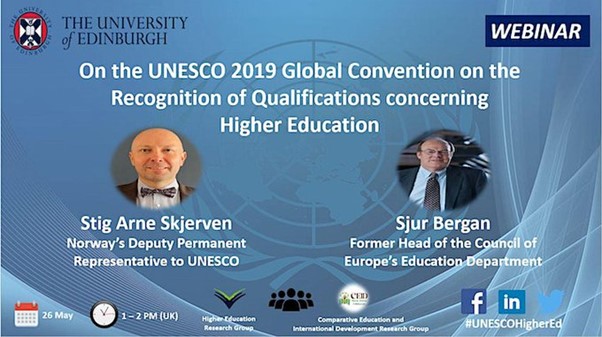
26 May 13:00-14:00
This online webinar is organised jointly by the Comparative Education and International Development (CEID) research group and the Higher Education Research Group (HERG) at Moray House School of Education and Sport, the University of Edinburgh. Stig Arne Skjerven and Sjur Bergan will discuss the UNESCO 2019 Global Convention on the Recognition of Qualifications concerning Higher Education. After individual presentations, there will also be time for the Q&A session.
Today, out of 235 million students worldwide, 6 million are studying abroad, up from 2 million in 2000. More than half of the 6 million are studying outside their region. In November 2019, the Global Convention on the Recognition of Qualifications concerning Higher Education was adopted by the 40th session of the UNESCO General Conference, becoming the first United Nations treaty on higher education with a global scope.
The Global Convention establishes universal principles for fair, transparent and non-discriminatory recognition of higher education qualifications and qualifications giving access to higher education and offering avenues for further study and employment. With provisions on non-traditional learning modes, the Global Convention also facilitates the recognition of qualifications, prior learning and study periods earned remotely. In addition, it promotes the recognition of refugees’ qualifications, even in cases where documentary evidence is lacking.
By ratifying the Global Convention, countries commit to strengthening international cooperation in higher education, raising its quality at home and worldwide, and helping make academic mobility and the recognition of qualifications a reality for millions around the world.
It is open to UNESCO Member States and the Holy See. The Global Convention received its 20th ratification on 5 December 2022, and entered into force on 5 March 2023. As of January 2023, 21 countries have ratified.
In this webinar, we offer contextualisations, holistic summaries and informed conversations around the Convention. We explore its inception and contours, the webs of interests and stakeholders partaking of it and the many different issues and challenges involved, mainly, but not exclusively, with respect to implementation. For more details about the Convention, please visit https://www.unesco.org/en/higher-education/global-convention, and join us to hear from world-renowned experts!
Speakers:
Sjur Bergan, Former Head of the Council of Europe’s Education Department
Sjur Bergan was Head of the Council of Europe’s Education Department until February 1, 2022. He led the Council of Europe projects on Competences for Democratic Culture and the European Qualifications Passport for Refugees. Sjur represented the Council of Europe in the Bologna Follow Up Group and Board between 2000 and April 2022 and chaired working groups on structural reforms in 2007 – 15. He remains a member of EHEA working group on the fundamental values of higher education and the group overseeing the Roadmap accompanying San Marino’s accession to the EHEA.
Sjur was a member of the editorial group for the Council’s White Paper on Intercultural Dialogue and a main author of the Lisbon Recognition Convention as well as of recommendations on the public responsibility for higher education; academic freedom and institutional autonomy; and ensuring quality education.
Sjur was series editor of the Council of Europe Higher Education Series and the author of Qualifications: Introduction to a Concept and Not by Bread Alone as well as of numerous book chapters and articles on education and higher education policy. Sjur was also one of the editors of the Raabe Handbook on Leadership and Governance in Higher Education (2009 – 15) and one of the session coordinators at the Bologna Process Researchers’ Conferences in 2015, 2018 and 2020. He is the recipient of the 2019 European Association for International Education Award for Vision and Leadership. In June 2022, Dublin City University awarded Sjur the degree of Doctor of Philosophy honoris causa.
Stig Arne Skjerven, Norway’s Deputy Permanent Representative to UNESCO
Stig Arne Skjerven is Norway’s Special Envoy / Deputy Permanent Representative to UNESCO in Paris, a role he has held since 2020. During the last decade, since the idea was put on the table by Norway, Skjerven has contributed to the development of UNESCO’s 2019 Global Recognition Convention for Higher Education Qualifications, which finally entered force in March 2023. In his previous role as head of Norway’s ENIC-NARIC office, he was twice elected as president of the ENIC Network. Skjerven is an experienced speaker and contributed in professional media on themes related to mobility and recognition. His background also includes being Director of Academic Affairs at a university college in Norway, and he is an historian by profession.





